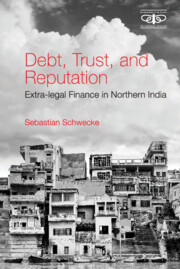8 - Reputation
Published online by Cambridge University Press: 30 November 2021
Summary
Least important of all for [the moneylender] is the possibility of having recourse to the law; and almost as unimportant (especially nowadays) is the possibility of acquiring his debtor's property.
Arjan was not the first moneylender I met in Banaras but in some ways the most important. I started contacting him through other people known to both of us as part of a brief feasibility study on ethnographic research in Banaras. He managed to avoid me for several weeks, giving polite excuses that demonstrated how little he wanted to meet me. In the end, he was unlucky. He suffered an accident and became bedridden for sufficient time to run out of excuses. Meeting Arjan was a lucky turn for me, though, since our conversations undermined many of my initial assumptions on money lending. I had expected to find a highly exploitative system of credit depending on debt traps extending into an economy of displacement, an economy of favours (or debt-enforced labour), and significant levels of organization.
What Arjan's self-depiction demonstrated, however, was an almost comprehensively ‘amateurish’ economy that primarily worked on simple interest aggregation by a highly diverse assortment of lenders following complex operational logics. And it was much more exploitative than anticipated. A particularly frustrating element of Arjan's self-depiction – for me – was the absence of any shred of a Schumpeterian ‘entrepreneurial spirit’: Arjan had taken over money lending from his father. His clients either had been his father's clients, or their descendants, or they were living in the houses of his father's clients in cases where entire families had moved out. Before passing away, his father had raised the typical interest rate for his loans to 20 per cent per month, and Arjan had not bothered to raise it further, though by 2011 it was a fairly cheap rate for petty loans. He almost never took on new clients and had only ever done this when his existing clients asked him to give loans to friends of theirs. His clients had various social backgrounds, but were only from within the neighbourhood, and the diversity was mostly the outcome of changes in family fortunes over the decades.
- Type
- Chapter
- Information
- Debt, Trust, and ReputationExtra-legal Finance in Northern India, pp. 272 - 340Publisher: Cambridge University PressPrint publication year: 2022

